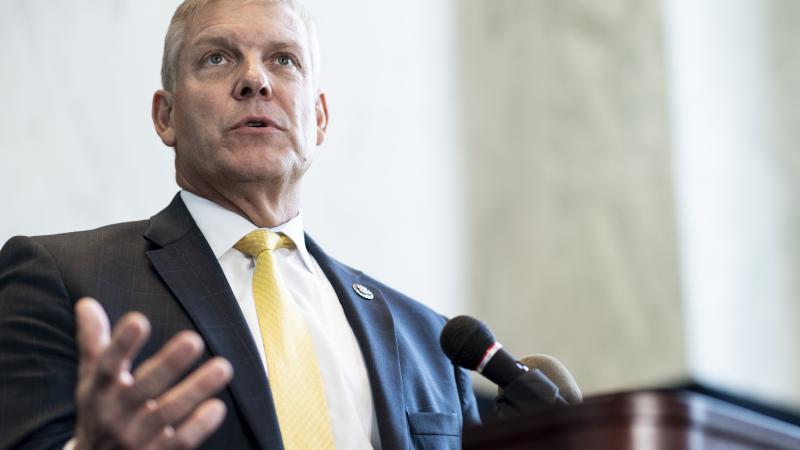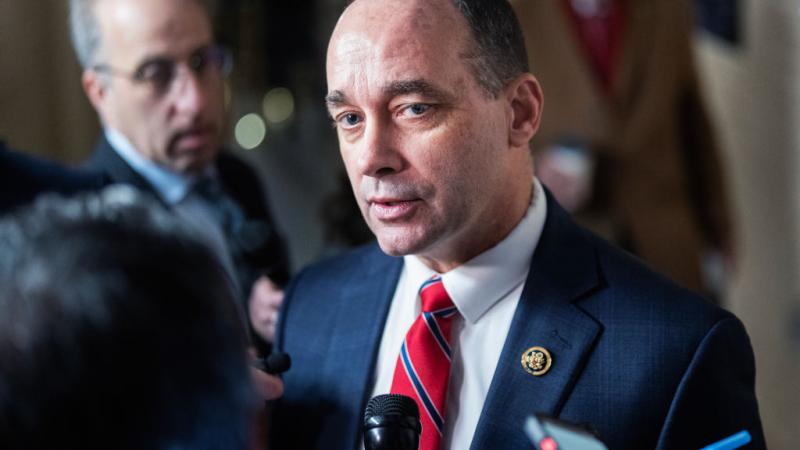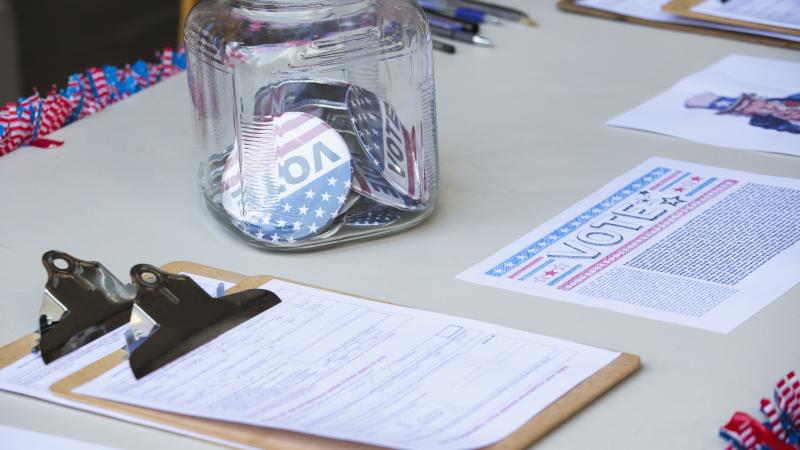SCOTUS showdown? Democrat-appointed judges gut free speech for students, GOP appointees protect them
Author of President Obama's drone-strike memo says schools can prohibit expression like "only two genders" because it "assertedly demeans characteristics of personal identity," even if done "passively, silently, and without mentioning any specific students."
With a Supreme Court decision any day now on the First Amendment boundaries of governments pressuring social media platforms to censor disfavored narratives, two federal appeals courts have now reached opposite conclusions on how far schools can go to restrict student speech, setting up a likely trip to the high court.
Middleborough Public Schools is not violating student Liam Morrison's rights by prohibiting him from wearing shirts that say there are "only two genders" – and after his first punishment, "censored genders" – as his response to the Massachusetts district's encouragement to students to express LGBTQ messages, the 1st U.S. Circuit Court of Appeals ruled Sunday.
In doing so, the Boston-based court narrowly construed the Supreme Court's seminal 1969 precedent known as Tinker, which famously declared that students do not "shed their constitutional rights to freedom of speech or expression" – in that case, wearing antiwar black armbands – "at the schoolhouse gate."
Tinker doesn't protect expression that "assertedly demeans characteristics of personal identity, such as race, sex, religion, or sexual orientation," even if done "passively, silently, and without mentioning any specific students," according to the three-judge panel, all appointed by Democratic presidents, claiming to follow a "long line of authority" in previous rulings.
They portrayed Morrison's widely held view, based on the immutability of sex, as an invitation to cause disruption when expressed, giving school districts in Maine, Massachusetts, New Hampshire, Rhode Island and Puerto Rico nearly limitless authority to censor a viewpoint held by ideologically varied groups, from conservative Christians to gender-critical feminists.
NOW- Federal Appeals Court Sides with School in Dispute Over 'Only Two Genders' Shirt📍Middleborough, MA | Via @OvertonLive
In a case that has sparked debate over free speech in American schools, the First Circuit Court of Appeals has sided with Nichols Middle School in… pic.twitter.com/VFcFriOzyv
— Vigilant News (@VigilantNews) June 11, 2024
The unanimous panel, with no concurrences, construed its decision against the eighth-grader, who was in seventh grade when he wore the shirts and got punished, as an exercise in judicial restraint.
"The question here is not whether the T-shirts should have been barred," says the opinion by Chief Judge David Barron, previously a Justice Department lawyer known for secretly advising the president who later nominated him that Barack Obama could legally kill Americans by drone strike. "The question is who should decide whether to bar them – educators or federal judges."
The 8th Circuit ruled the opposite last October, issuing an injunction against an Iowa school district's policy prohibiting refusal to "respect" a peer's gender identity, with the St. Louis-based court saying it flatly violated Tinker.
That three-judge panel, with two Republican appointees, said schools cannot regulate student speech as an "invasion of the rights of others" because it is "merely offensive to some listener."
"The court’s decision is not only a threat to the free speech rights of public school students across the country, but a threat to basic biological truths," the Massachusetts Family Institute, which represents Morrison with the Alliance Defending Freedom, said on X.
"We are still deciding our appeal options," a spokesperson for ADF, which has overwhelmingly won cases that went to SCOTUS, told Just the News on Tuesday. It could ask for a full-court rehearing or petition the Supreme Court, which is sensitive to circuit splits.
"The school actively promotes its view about gender through posters and ‘Pride’ events, and it encourages students to wear clothing" that affirms its view, senior counsel David Cortman said. "Our legal system is built on the truth that the government cannot silence any speaker just because it disapproves of what they say."
Barron said the government could do exactly that to student speech, and used Cortman's own words against him.
The lawyer conceded at oral argument in February that administrators could prohibit a shirt reading "All Trans Kids Are Retarded" – a hypothetical by Judge Ojetta Rogeriee Thompson – as "fighting words."
"We do not use that ['retarded'] language lightly, but the example clarifies that all parties agree that there are messages so overtly and highly demeaning of a personal characteristic," including "religious, racial, and sex- and sexual-orientation-related slurs," that schools can prohibit on clothing "based solely on its words, even if no specific students are targeted," a footnote reads.
Barron cited a 7th Circuit injunction against an Illinois school district for prohibiting a shirt reading "Be Happy, Not Gay" because that court found the message was only "tepidly negative," distinguishing it from demeaning messages that "strike a person at the core of his being" because their personal characteristics are "unalterable" or "deeply rooted."
The ADF spokesperson agreed with two hypotheticals posed by Just the News, that Barron's logic means 1st Circuit school districts can prohibit shirts that say "Jesus didn't rise" because it would question the salvation of Christian students or "Mohammed is not a prophet" as an attack on a central figure of Muslim students' faith.
“There are only two genders” is a statement so triggering and traumatizing that students had to leave the campus. pic.twitter.com/y1nnCo2bkw
— Dr. Jebra Faushay (@JebraFaushay) May 29, 2023
Eight groups or coalitions filed friend-of-the-court briefs in favor of Morrison, identified as "L.M." in court filings but his full name in media appearances, at the 1st Circuit, including 16 Republican attorneys general and the Foundation for Individual Rights and Expression.
The ACLU of Massachusetts' brief asked the appeals court to reject the "rights of others" analysis by U.S. District Judge Indira Talwani, calling it a "legal error" because Massachusetts law exceeds First Amendment protections for student speech and the district didn't argue Morrison's expression "qualified as bullying."
By claiming invasion-of-rights applies to speech that makes "a group of potentially vulnerable students ... not feel safe," Talwani did not "adequately distinguish between alleged feelings of unsafety and mere offense or hurt feelings, which cannot justify suppression of student speech," the ACLU-MA said.
It asked the 1st Circuit to remand the case to Talwaini to consider whether the school can meet the other Tinker exception, for "speech [that] caused or was reasonably forecast to cause substantial and material disruption."
Barron's opinion does not appear to cite any outside brief but nods toward the ACLU's argument without remanding the case to Talwani.
"We affirm the District Court's rulings, albeit on somewhat different grounds," the chief judge wrote, noting it has held "the rights-of-others limitation applies in the case of bullying, even when there is no physical invasion of any kind."
While acknowledging SCOTUS said school districts have to meet a "demanding" standard to rely on the rights-of-others limitation in the off-campus, profane-cheerleader case known as Mahanoy, Barron invoked 9th and 10th Circuit rulings that approved bans on calling homosexuality "shameful" and simply drawing a Confederate flag.
Though the 7th Circuit said "Be Happy, Not Gay" could not be prohibited, it cited evidence that "adolescent students subjected to derogatory comments about such characteristics may find it even harder than usual to concentrate" and set off a chain reaction of insults between students that "deterior[ate] the school's ability to educate its students."
The "psychological effects" caused by some expression could lead to "a decline in students' test scores, an upsurge in truancy, or other symptoms of a sick school – symptoms therefore of substantial disruption," Barron said, quoting the 7th Circuit.
A footnote refers to an earlier 7th Circuit ruling, Muller, that distinguishes between adult and child psychology. An adult "Christian can tell the Jew he is going to hell" but "it makes no sense to say that the overly zealous Christian" child must be allowed to do the same to a Jewish classmate, which "could crush a child's sense of self-worth."
Mahanoy does not require a school to "be certain" but just cite facts that "might reasonably lead school officials to forecast substantial disruption," Barron wrote, quoting the 7th Circuit. "Tinker does not require school officials to wait until the horse has left the barn before closing the door," he said, quoting the 6th.
"The material-disruption limitation has served as a workable doctrinal means of accounting for the concerns that arise in this context and that Tinker requires us to assess," the opinion says. "It usefully permits the depth of the expression's disruptive impact on the learning environment to be evaluated in relation to myriad school contexts and the myriad forms that assertedly demeaning speech may take."
The Facts Inside Our Reporter's Notebook
Documents
Links
- First Amendment boundaries of governments pressuring social media platforms
- "only two genders" â and after his first punishment, "censored genders"
- 1st U.S. Circuit Court of Appeals ruled
- Supreme Court's seminal 1969 precedent known as Tinker
- @OvertonLive
- pic.twitter.com/VFcFriOzyv
- June 11, 2024
- secretly advising the president who later nominated him
- The 8th Circuit ruled the opposite
- Massachusetts Family Institute
- David Cortman said
- oral argument in February
- 7th Circuit injunction against an Illinois school district
- pic.twitter.com/y1nnCo2bkw
- May 29, 2023
- friend-of-the-court briefs
- profane-cheerleader case known as Mahanoy
- 7th Circuit ruling, Muller















